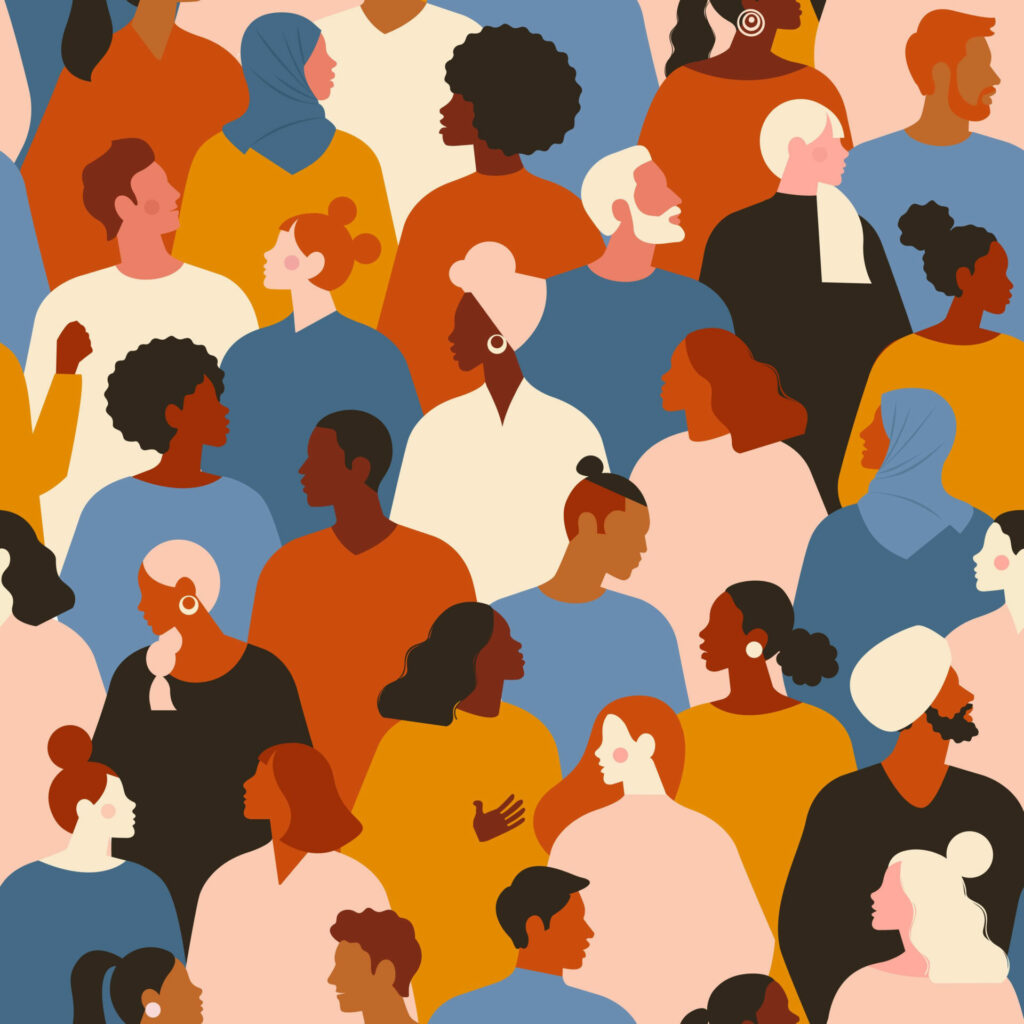What Do Each of These Words Mean?
Justice
Breaks down barriers of racism, classism, sexism, ableism, homophobia, transphobia, and other forms of discrimination that exclude people, groups, and populations so that everyone has the resources and opportunities to live a healthy, happy, and full life.
Equity
Recognizes the barriers that exist for people, groups, and populations and re-distributes resources based on need so that everyone has access to the same opportunities. Equity is the approach to achieving equality.
Diversity
Represents all the differences between us based on people’s identities, as well as the systemic advantages or barriers we encounter.
inclusion
Cultivates a sense of community that meaningfully embraces, celebrates, and centers the perspectives and styles of the people, groups, and populations who encounter more barriers based on their identities.

Our Commitment
We view Justice, Equity, Diversity, and Inclusion not as a separate component of our work, but as the overarching blueprint through which we move toward a more just and sustainable society. That’s why Just Zero is committed to continuously examining and addressing access, power, racism, and social justice in all aspects of our work. That includes organizational decisions, program priorities, team conversations, hiring, internal and external communications, and organizational growth.
Just Zero is a compassionate, welcoming, supportive, and equitable institution with zero tolerance for harassment, insensitivity, racism, sexism, ableism, ageism, homophobia, transphobia, xenophobia, or any other form of discrimination or bigotry. We strive to create a work environment where every team member feels safe to be their full, authentic self.
56%
Of residents living within 3 kilometers of a hazardous waste facility are people of color
Source: TOXIC WASTES AND RACE AT TWENTY
Fulfilling Our Commitment
We understand that the values of Justice, Equity, Diversity, and Inclusion are not only important, but also evolving. We also recognize our limitations and the continued room for growth. We will learn, grow, and fulfill our commitment through:
| Transparency | Plans, strategies, decisions, schedules, and salaries are open and accessible to all team members. |
| Equitable Hiring Practices | Recruiting diverse talent is a priority for Just Zero. As such, all job postings, interview processes, and onboarding practices will be developed and implemented through a just, equitable, diverse, and inclusive lens. |
| Trainings | Just Zero will hire experts on Justice, Equity, Diversity, and Inclusion to host regular trainings for all staff on these values. Learnings will be incorporated into Just Zero’s day-to-day operations. |
| Learning Sessions | Just Zero aims to create a brave and safe space for staff to learn and discuss topics surrounding Justice, Equity, Diversity, and Inclusion. This includes difficult conversations where we hold ourselves and the organization accountable. |
| Organizational Feedback and Improvement | Just Zero regularly solicits feedback from staff and board members on the organization’s policies, practices, and finances to assess its progress toward implementing Justice, Equity, Diversity, and Inclusion. Areas where staff and board members indicate the organization needs to improve will be modified to meet expectations for a just, equitable, diverse, and inclusive work environment. |
How Justice, Equity, Diversity, & Inclusion Relate to Zero Waste
Black and brown communities, low-income communities, and communities of limited English-speaking proficiency have been – and continue to be – disproportionately impacted by pollution, climate change, and the waste crisis. Why do these environmental injustices exist? Because of racism, classism, white supremacy, and other discriminatory barriers.
These barriers have brought a great deal of harm to people, groups, and populations across the country and the world. That’s exactly why Just Zero strives to view our work through an environmental justice lens. Because all people, regardless of race, ethnicity, income, or location, deserve to live in healthy, safe communities.
We are indebted to the legacy and leadership of the Black and brown leaders in the environmental justice movement and are committed to following and learning from their leadership and demonstrating solidarity.
7,000,000
People worldwide die from air pollution each year
Source: World Health Organization
Working with Environmental Justice Communities
At Just Zero, we are committed to working under the leadership of environmental justice communities. We believe the folks who are directly impacted by environmental injustices are the ones who know the best solutions for their communities.
All communities deserve a healthy environment. Just Zero will continue to work alongside communities to shut down existing landfills and incinerators, stop the construction of new, dangerous waste facilities, and push for innovative laws and regulations that protect people and the environment.

Read · Listen · Watch · Learn
To enact real change, we all need to learn, grow, and take action – together. Here are some resources that members of our team found inspiring:
| Book | A Terrible Thing to Waste: Environmental Racism and Its Assault on the American Mind by Harriet A. Washington |
| Report | Beyond Diversity by Green 2.0 |
| Film | Crip Camp: A Disability Revolution |
| Organization | Environmental Justice Atlas |
| Organization | Equal Justice Initiative |
| Book | How to Be an Antiracist by Ibram X. Kendi |
| Organization | J.E.D.I. Collaborative |
| Podcast | People Over Plastic |
| Implicit Association Test | Project Implicit |
| Podcast | The Diversity Gap |
| Book | The Intersectional Environmentalist by Leah Thomas |
| Blog | What’s the Difference Between Diversity, Inclusion, and Equity? |
| Book | White Fragility: Why It’s So Hard for White People to Talk About Racism by Robin DiAngelo |